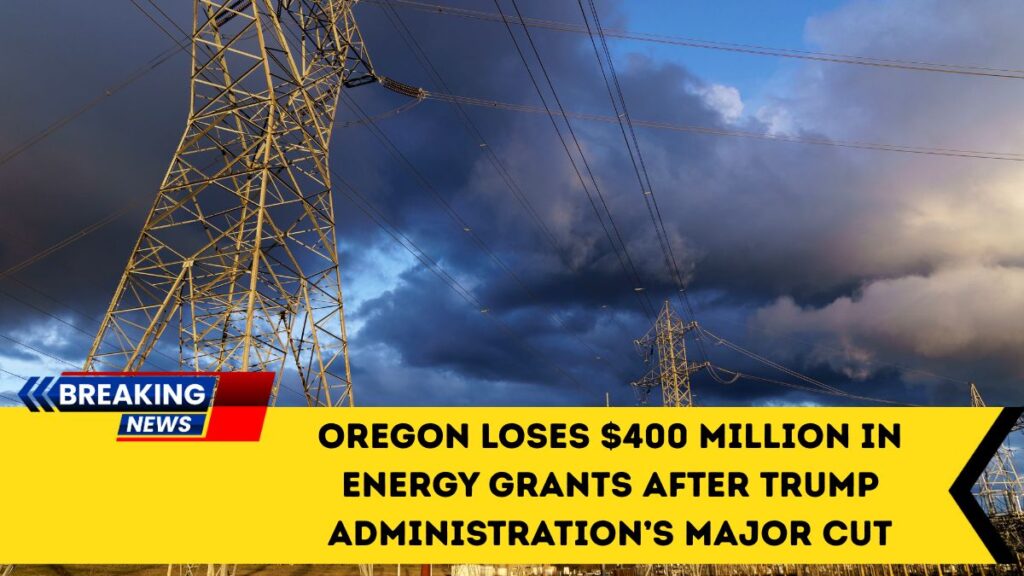The U.S. Department of Energy has decided to cancel more than $400 million in energy grants that were meant for Oregon. This sudden move has created major concerns among state officials, clean-energy developers, and residents.
The funding was supposed to help improve Oregon’s power grid, support clean-technology manufacturing, and create green jobs.
Without it, several energy projects are now uncertain or delayed. Let’s look at what this means for Oregon, why it happened, and how it could impact local communities.
What Happened
The Department of Energy recently announced that 19 federal energy grants, worth about $405 million, are being terminated in Oregon. These grants were planned to boost energy efficiency, transmission upgrades, and clean-energy job training.
The cancellation affects a variety of organizations, including research institutions, manufacturing firms, and public utilities that were counting on federal funds to move forward.
Many of these projects were already in progress or preparing to begin. Now, local officials fear the loss of investment will slow down Oregon’s progress toward becoming a clean-energy leader in the United States.
Why Were the Grants Cancelled
According to federal officials, the decision came after an internal review found that several projects did not meet updated economic or national security standards.
The government says it is trying to ensure all funding is used effectively and that each project truly benefits taxpayers.
However, many Oregon leaders believe the decision might be politically influenced. They argue that states working on aggressive climate and renewable-energy plans are being hit hardest by these federal funding cuts.
Critics say the move goes against America’s broader goal of energy independence and green innovation.
Projects Most Affected
| Project Type | Purpose | Effect of Cancellation |
|---|---|---|
| Grid Upgrades | Improve power lines and reduce outages | May cause more blackouts or slow modernization |
| Energy Efficiency Programs | Help homes and businesses save energy | Could lead to higher electricity bills |
| Clean Technology Manufacturing | Support factories making renewable energy equipment | Job losses and less investment in new industries |
| Workforce Development | Train people for clean-energy jobs | Fewer employment opportunities in energy sectors |
These projects were part of a larger plan to help Oregon shift toward renewable power sources and create local jobs in clean energy. Without the grants, both goals may take longer to achieve.
Impact on Oregon Residents
The biggest concern is that everyday Oregonians could face higher energy costs. Energy-efficiency programs help lower power bills, but if they stop, families might pay more for electricity.
Also, several clean-technology projects were expected to bring new jobs to communities across the state. Losing those grants could reduce job growth and discourage private companies from investing in renewable energy in Oregon.
Local governments now need to decide whether to replace the lost funding with state or private money. However, finding that much money will be challenging, especially since many cities already face tight budgets.
What’s Next
Oregon officials and affected organizations may appeal the federal decision, but it’s unclear if that will succeed. Some groups are looking for alternative funding, possibly through state budgets or partnerships with private investors.
Environmental groups are also urging the state to create its own clean-energy fund to keep critical projects alive.
Even though this is a setback, Oregon’s long-term goal of reaching 100% clean electricity by the 2040s remains unchanged. Local leaders believe that public support for renewable energy will continue to grow despite the financial challenges.
The cancellation of more than $400 million in energy grants is a major blow to Oregon’s clean-energy future. It threatens job creation, slows the development of green technology, and could make power more expensive for families.
While the federal government says the move is about protecting funds, critics see it as a step backward for climate progress. Oregon must now look for new solutions to keep its renewable-energy plans moving forward and continue its journey toward a sustainable future.
